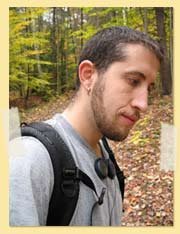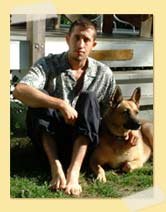The “Ex-Gay” Movement and The Negative Impact It Has Had On My Life
Seth Guyette
I am a gay man who has never identified as “ex-gay”. Regardless of the fact that I have never partaken in any sort of “reorientation” counseling (aka “conversion therapy”), “ex-gay” politics and philosophies have harmed me and the relationship with some of my family members. I am not the only one this has happened to. The following personal account is not meant to vilify any of my loved ones or negate any form of religion. I was a fairly sensitive, creative child with a bright outlook. Although my family had its share of unusual dynamics and classic dysfunction, we always pulled through in a spirit of love, doing the best we could. My siblings and I were brought up as Baptist/Evangelical Christians within a fairly sheltered environment and we were instilled with a desire to live an honest, clean life. My brother and I were even educated in a private, Christian school and our intake of non-religious media was monitored and regulated well into my later teen years. This form of Christianity, while it has a lot of positive aspects, also relies on a very literalistic interpretation of the Bible, which condemns homosexuality as being, by nature, sinful.
I was a fairly sensitive, creative child with a bright outlook. Although my family had its share of unusual dynamics and classic dysfunction, we always pulled through in a spirit of love, doing the best we could. My siblings and I were brought up as Baptist/Evangelical Christians within a fairly sheltered environment and we were instilled with a desire to live an honest, clean life. My brother and I were even educated in a private, Christian school and our intake of non-religious media was monitored and regulated well into my later teen years. This form of Christianity, while it has a lot of positive aspects, also relies on a very literalistic interpretation of the Bible, which condemns homosexuality as being, by nature, sinful.
The religious social circles where my family circulated always presented a negative view of homosexuals. This attitude started to generate a lot of personal anxiety around age eleven, when typical male biological changes began and I found myself experiencing strong physical and emotional attractions to other males. This directly contradicted what I was taught, causing me to fear my life and spiritual salvation. I knew that I could not risk telling anyone about it in light of the possibility of social stigma and harsh, religion-based counseling. Therefore I kept my sexuality deeply hidden. After graduating from high school life became more complicated. Everything had been structured around the false notion that I was heterosexual and it was assumed that I would start living my life in the fashion of a conservative, Christian man with an innate attraction to the opposite sex. I was constantly at war with the steady diet of dogma and anti-gay condemnation that had been drilled into my mind from a very early age.
Despite this, I had developed a small, hidden circle of gay friends with whom I felt a sense of comfort and camaraderie. My issues were later compounded when I decided that 'coming out' to my parents was the honest, logical thing to do. I had seriously considered the prospect of living a double life where I would masquerade as a heterosexual, possibly taking on a girlfriend or wife, but this form of living seemed dishonest, needlessly complicated, and unnatural (not to mention the damage that this type of deceit can do to one's spouse and family down the road). So I stopped hiding my social circle and began leaving strong indicators to help my parents understand the true nature of their son.
One day my father asked me to go for a ride with him, during which he played a promotional cassette tape filled with what I can only describe as anti-gay propaganda and religious theory describing homosexuality in terms of 'unnatural attractions' and 'sexual brokenness'. The speaker advertised special religious institutions where one could send their 'confused' loved one to get them 'treatment' for unwanted same-sex attractions. My dad perceived that my sexual orientation was a problem and was urging me to submit myself to a religious reorientation and treatment program. I felt completely humiliated and angry that my own flesh and blood chose to think that I had an illness in need of a cure instead of considering it to be a natural state of being above and beyond the stereotypical, fundamentalist understanding of the natural order within the human species. I completely refused their attempts to make me attend any sort of “ex-gay” support group or therapy. From that point forward my parents and I became very distant from each other. It had become clear that I was unable to help them see what I was going through and how I felt.
Not long after the car ride and a subsequent angry confrontation, my father left a letter for me in my room. It suggested that my parents were at their wits' end regarding my supposed “choice of lifestyle” and they could not continue to have me living in their household if I did not turn myself around and get some help. They were collecting a reasonable rent from me while I still lived there, attending trade-school classes part time and working full time. I really needed steady, inexpensive lodging so that I could continue with my education, but I would not allow myself to be coerced into butchering a part of me which is natural and immutable. When I responded that I would rather be homeless they ended up backing down, but I have read the accounts of and personally known some folks who were not able to withstand this sort of pressure from their families and were forced to endure “ex-gay” counseling under threats of cutting off college funding/living expenses or the possibility of being disowned. Some were disowned/ostracized regardless and without any form of negotiation. I ask you this:
- Is threatening a beloved family member an effective way of understanding them?
- How many “ex-gay” counselors and support groups encourage these types of coercive methods in the interest of putting people into their counseling programs?
- Is it wise to entrust a loved one to unconventional treatments being administered by people who have a vested interest in rejecting the American Psychological Association's assertion that same-sex attraction is not a psychological disorder
A few months later, I finally finished my classes and moved out. By then it felt like my parents were antagonistic strangers. Emotionally it was as if I had been abandoned by the two members of my family with whom I had been closest. Some of this was not their fault as they had no experience in dealing with variant sexuality within the context of the more modern understanding of it. This was an area of self-realization and development where they were unable to follow and this unknown frightened them.
When one has had all that he knows and loves taken away from him, feelings of loneliness and worthlessness set in, making a person feel as if he is backed into a corner with nowhere to go. A desperate need for affection and understanding can drive you to anything that gives a feeling of fulfillment, even if it is only temporary. Like many others who have been in this situation, I ended up pursuing a long, self-destructive pattern of thrill-seeking to stave off the emptiness I felt; spending time with a rough, shady crowd of people, drinking heavily, doing drugs, and taking a lot of physical risks. I also came close to taking my own life on several occasions and developed a heavy psychological addiction to marijuana for several years. I am not passing off responsibility for my actions; I did many foolish things by my own choice, but I am certain that the party/drug culture would not have caught my interest if I had received support and understanding where it was needed most. I ask these questions:
- Is the “ex-gay” movement aware of the amount of people who have had their hope stolen and are driven into these self-destructive habits by well-meaning loved ones?
- How many “ex-gay” programs and religious authorities actively teach that these self-destructive habits are a symptom of homosexuality instead of a symptom of the rejection encouraged by an anti-gay, religious social paradigm?
- How many suicides could be prevented if parents did not emotionally isolate their children for lack of understanding?
About five years ago, while working as an agency LNA at a local hospital I met Tim, who was to become my first live-in partner. He eventually ended up moving in with me and we stayed together for over two years. Though we weren't the best match, we still loved each other. Even in light of some of our incompatibilities, our relationship was significantly strained by the fact that I had very little support from my family, time spent with them was usually tense and uneasy, a major part of that being my parents' attitude. When Tim and I visited together they were uncomfortable around us and refused to acknowledge us as a couple. Tim often felt unwelcome and excluded. His parents were warm and welcoming by comparison. To my parents' credit, though they did not acknowledge us as a couple, they were at least civil to Tim, which, given the nature of their religious stance, was more than I expected from them. Many “ex-gay” programs encourage family members not to acknowledge the relationships of homosexual couples in their midst for fear it validates the couple's partnership. Tim and I eventually separated but remained friends. He lost his life to brain cancer a year later. We parted ways on this Earth with many things left unsaid. Normally, when one loses a spouse and/or close friend, he can talk with the family about it and lean on his parents for support and advice, but why was I not able to do this with my own parents? Because they operate from the position that homosexuality is unnatural and a curable disorder. I get the strong sense that in their mind my relationship was, by nature, sinful, that Tim's death may have been tragic but to acknowledge that their son lost a friend who was also a former partner would be akin to supporting homosexuality. Seeking sympathy or support from people with this mentality only results in more feelings of pain and isolation, compounding the feelings of being alone and broken. If not for my sister and some sympathetic friends I would probably still be manifesting a lot of emotional damage from this period in my life.
Tim and I eventually separated but remained friends. He lost his life to brain cancer a year later. We parted ways on this Earth with many things left unsaid. Normally, when one loses a spouse and/or close friend, he can talk with the family about it and lean on his parents for support and advice, but why was I not able to do this with my own parents? Because they operate from the position that homosexuality is unnatural and a curable disorder. I get the strong sense that in their mind my relationship was, by nature, sinful, that Tim's death may have been tragic but to acknowledge that their son lost a friend who was also a former partner would be akin to supporting homosexuality. Seeking sympathy or support from people with this mentality only results in more feelings of pain and isolation, compounding the feelings of being alone and broken. If not for my sister and some sympathetic friends I would probably still be manifesting a lot of emotional damage from this period in my life.
My mother had a spate of serious health problems for the last few years and all the initial indicators pointed to cancer. Cancer diagnosis is not as much of a death sentence as it used to be considering the advancements that have been made in treatment techniques, but one still worries about the risk of treatments being ineffective. I was saddened that she was hurting and depressed about the possibility of her succumbing to the same class of wasting disease that had claimed Tim. I was also concerned about my father who appeared worn out and hollow from this ordeal. I thought about what it would mean to me and what it would do to my family if my mother died. Due to our distance over the years, I probably would not have the capacity to be emotionally available to my father if this sort of loss occurred. I was very upset that my mother's life suddenly seemed so delicate. I still mourned the loss of a large part of her, a large part of both my parents years ago when they rejected my true identity. It is painful to admit all of this to myself and write it down for others to see. It worries me that my parents may some day read this and think that their son is insensitive or that I am using them and their situation to further some sort of personal vendetta for their inadequacy.
Thankfully, my mother has now been diagnosed with a disorder which is far less threatening. Still, this whole experience exposes another level of destruction that ”ex-gay” ideologies can have on a person's life.
- Do the “ex-gay” organizations consider the negative impact they are having on families like mine, how they are degrading family members' perceptions of each other?
- If so, do they truly care about that and try to prevent it, or do they write it off as collateral damage in the service of their vision of 'God's Plan' or 'The Greater Good'?
- How many family relationships could be saved if “ex-gay” initiatives did not promote a scientifically disproven view of sexual orientation?
I am proud of my parents for all the personal problems and hardship they have overcome in their lives. They have matured into better people over the years and increased their ability to live with grace and kindness. They continue with efforts to be more peaceable with their family and it is my sincere belief that they did the best they could with what they had while raising us. They are good people who mean well, even if in some respects they are operating with grave misconceptions. I constantly remind myself that all parents make mistakes and I forgive them for theirs while remembering to forgive myself for the ones I have made. I am human as they are.
My parents continue attending and financing a religious support group which promises healing and false hopes for people who do not accept their children's same-sex attractions; they network with peers who hold similar beliefs and work hard to promote anti-gay, “ex-gay” ideologies. They are still buying into the “ex-gay” propaganda which states that those with same-sex attractions can be reprogrammed or that they should live celibate lives without a partner even though it is counterproductive, damaging and unnatural for a majority of the lesbian/gay/bisexual/transgendered community to conform to this ideal.
It has now been ten years since my parents realized that their son is gay. We get along a little better now and I hold on to the hope that we will someday see eye to eye again, but I can not structure my life around that possibility. If I ever meet the man who will become my life partner and my parents make him feel uncomfortable or excluded, I have resolved that I will be more proactive in confronting them about it and, if necessary, further removing myself from their lives in the interest of keeping peace within the family. I dearly love my Mom and Dad but after experiencing significant damage from their misguided attempts to railroad me into ex-gay therapy, to change me into what I am not and never can be, I can not take a position that even passively allows one person to make another person feel less than whole on the basis of their sexuality.
There are those who would say that the base of my bad experiences derives from selfishness and that my family was just fine before I had the audacity to ruin it by being open about and acting upon my sexual orientation. The true problem is rooted in a complex, self-promoting form of doctrine which drives a wedge between the parent and child; separating family and friends while poisoning strangers against each other before they even meet; actively promoting a viewpoint which portrays a person as broken when there is nothing wrong with them. I may never know how the parent/son relationship might have progressed if my own parents did not have the ingrained belief that homosexuality is unnatural and changeable, but I will continue to love them regardless.
Spokespeople for various “ex-gay” organizations have recently taken the position that they are being picked on. They seem to be saying, ”We are simply doing what we feel is right and not hurting anybody. Why can't you be content to leave us alone?” The stark fact is that many people ARE being hurt. These organizations might be left in peace if their words and actions were not continually harming others, damaging lives and relationships, imposing unreasonable limitations, and brainwashing our friends and families into thinking that we are a walking social disease. Some “ex-gay” programs have mistakenly convinced parents that their own personal shortcomings or errors in judgment have caused their children to become homosexual, trans gendered, or bisexual. Some folks have even been convinced that their loved one's sexuality is a punishment from God for something that they have done wrong. I wonder:
- How does this sort of thinking promote family cohesiveness or contribute to the greater good of humanity?
- Can we justify standing by quietly while “ex-gay” leaders continue with efforts which degrade or completely rob us of the years of love, joy, and common ground that can be shared with the people we love?
Despite what I have been through, I have had it easy compared to some. For the most part, I have been able to pull myself back together and cease being a victim. I do still have a caring relationship with my parents, even if it is a shallower version of what it once was or could be. Others have had their lives and personalities fragmented beyond recognition as the result of loved ones who have ostracized them wholly or partly based on their sexuality. Many more are healing from the damage inflicted by “reorientation” treatment. I ask:
- Is the “ex-gay” movement considering the long-term ramifications of this as well as their level of accountability for the emotional damage that they have caused?
- How do they answer to people who have been harmed or destroyed by the efforts of family members who bully loved ones into “reorientation treatment” by acting under the auspices of the 'tough love' aspect of “ex-gay” philosophy?
- Do they closely monitor the rates of mental illness, drug abuse, health problems, and suicide attempts both before and after these treatments?
- If this monitoring does take place, is it performed in an impartial, scientifically accepted manner (in the interest of minimizing false statistics)?
- Are they completely transparent about their data collection methods?

I have come away from my past experiences with a lot of hurt, but have gained a lot of strength and clarity in the process. I have learned to be highly independent and steadfast in the face of adversity. Hardships have taught me to be more compassionate, creative, and circumspect. I now possess a better understanding of what really matters in life, how short and precious it is. I have been taught that it is important to attempt peace-making with those you love before it is too late. I have learned to be more cautious in choosing who and what I allow to influence me, also that it is important to be diplomatic but firm and knowledgeable in one's own beliefs when dealing with those who hold strongly opposing views. I continue to relearn the art of kindness, listening to people, learning from their experiences, and helping them in their journey. There has also been great strength in sharing my own experience so that others benefit from it. Even those who misunderstand us are still our brothers and sisters; they are a part of humanity and a part of us. Understanding them as we wish to be understood, regardless of whether or not that effort is reciprocated, can bring healing and closure. In spite of my past brushes with fundamentalism, I have reapproached religion, ignoring the dogma while still choosing to serve what I have come to know as the Divine Truth in all of us. Religion is not the problem, the real issue lies in the darker side of mankind divisively twisting our various forms of Faith into a tool to stigmatize what they refuse to understand.
